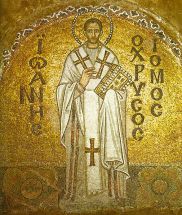Political Sermons – St. John Chrysostom
I -myself- believe religion and politics can not be mixed, they are totally different in believing, exposing and handling them, so those small excerpts are not the Christianity opinion about politics -or I will be contradicting myself- but they are more like opinions, ideas and thoughts of a major spiritual thinker in early church St. John Chrysostom (347–407) mentioned in his sermons, I found some of these excerpts are very appropriate for the current situation in Egypt and may be in many other countries. They answer some questions we might have in our minds.
1. Can we protest against our rulers?
“Is every ruler elected by God to the throne he occupies? Is every emperor, king, and prince chosen by rule? If so, is every law and decree promulgated by a ruler to be regarded as good, and thus to be obeyed without question?
The answer to all these questions is, no. God has ordained that every society should have rulers, whose task is to maintain order, so that people may live in peace. God allows rulers to employ soldiers, whose task it is to capture and imprison those who violate social order.
Thus God bless and guide any ruler and any soldier who acts according to these principles. But many rulers abuse their authority by amassing huge wealth for themselves at the expense of their people, by unjustly punishing those who dare to speak against their evil, and by making unjust wars against neighbors. Such rulers have not been elected by God, but rather have usurped the position which a righteous ruler should occupy. And if their laws are wrong, we should not obey them. The supreme authority in all matters is not the law of the land, but the law of God; and if one conflicts with the other, we must obey God’s law”
2. Should not we apply God’s law -or Share’a- on earth?
“There are three types of government. The first is where one person, or group of persons, pass laws and issue decrees which everyone must obey. The second is where every person is his own master, acting as he or she thinks fit. The third is where God is acknowledged as ruler, and all people seek to follow his way of love. This third type of government is the ideal of which we should aspire, and for which we should pray. And if every person were truly seeking to follow God’s way of love, then we could also have the second type of government. We would know that if people were free to make their own decisions on all matters, these decisions would conform to God’s law, so there would be perfect harmony.
However no society has ever existed in which every member fully and consistently tries to obey God; there are always people motivated by greed and self-interest.
For this reason there need to be individuals or small groups who pass laws and issue decrees which can be enforced. The existence of the first type of government is a tactic admission of human sin and frailty. the challenge is to ensure that these lawmakers act on behalf of the people as a whole and not just for their own benefit.”
3. Can priests -or Sheikhs- be politicians?
“How should the church be governed? Should the patriarchs act like emperors, issuing decrees which all believers must obey? Should bishops see themselves as local governors, demanding unquestioning submission of the people? Should the clergy be a kind of spiritual army, enforcing the will of the patriarchs and bishops, and meting out punishment on sinners?
The first consideration for the church is not how to punish sins, but how to prevent sins from being committed. And when a sin has been committed, the task of the church is to encourage the sinner to confess the sin and make amends; so that no punishment is required. This is a quite different attitude to wrongdoing from that which the state adopts, and so required a quite different style of government.
Moreover, each individual is answerable not to be a priest, bishop, or patriarch, but to God. So the primary authority of those within church is not to issue decrees, but to stir the souls and enliven the consciences of believers, so that by their own volition they will obey the laws of God. In shorter those in authority within the church should see themselves not as rulers, but as preachers and pastors.”
Reference:
- “On Living Simply” Book

